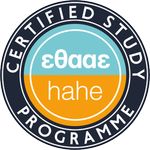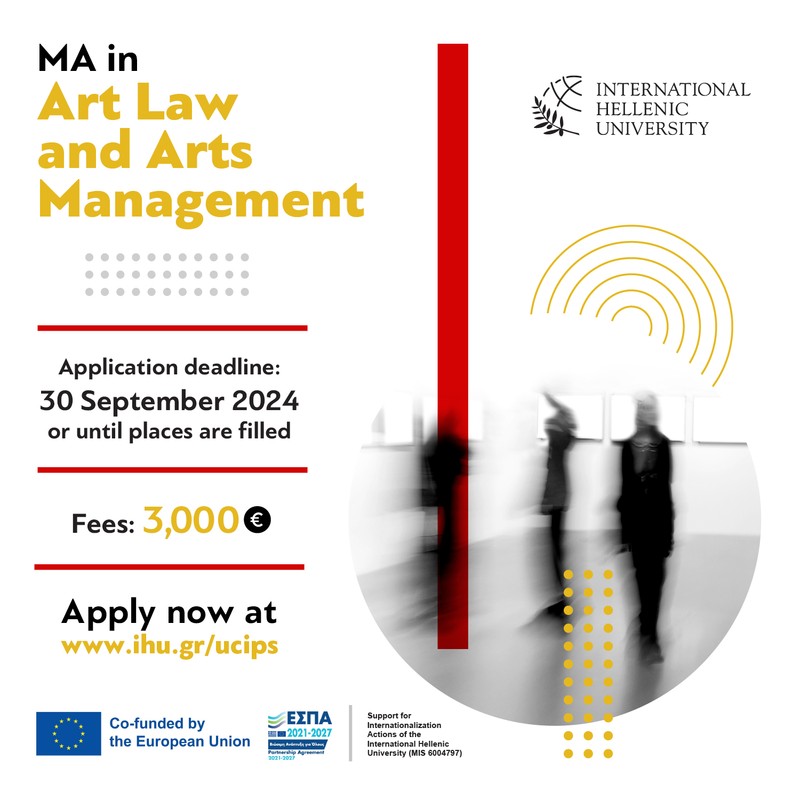Overview
The “MA in Art Law and Arts Management” Programme is being offered by the School of Humanities, Social Sciences and Economics of the University Center of International Programmes of Studies of the International Hellenic University.
The Programme aims at exploring and highlighting the functional interdependence between art law and arts management. Particular emphasis will be placed upon the legal, financial and political considerations and the corresponding regulatory approaches implemented in Europe and elsewhere concerning the creation of digital works of art, the art trade, the operation of the markets concerned, the function of intellectual property law at the EU and international level, the protection of cultural heritage and protection against unlawfully acquired works of art.
The Programme adopts a multi-disciplinary approach and is addressed to graduates of various academic backgrounds, including law, economics, political science, history of art, philosophy, etc. (from Greek universities or equivalent institutions from abroad, as well as from Technological Educational Institutions), who wish to specialize in the interrelation between art, law and the economy.
We aim at providing candidates with:
- the specialized legal, financial and cultural background to pursue a successful career in academia and research, private organisations that commercialise works of art, museums, art collections, law firms practicing in the field or public sector organizations involved in the management, legal protection, re-claiming and supporting works of art;
- legal and financial expertise on the operation and management of art markets (including sales of works of art, art portfolio management, art auctions etc.);
- in-depth knowledge on the national and international legal framework on national heritage, monument preservation, art loans or archaeology laws;
- intellectual property law expertise within a globalized art market;
- insights on those fields of law (constitutional, civil, penal etc.) affecting the legal protection of works of art.
The courses are taught exclusively in English. The academics teaching on the programme come from universities both abroad and in Greece and their expertise assists students get acquainted with theoretical, as well as practical art law and management issues.
The “MA in Art Law and Arts Management” Postgraduate Programme, with an awareness of the fact that the University operates in an ever-changing environment, promotes learning and teaching characterised by a diversity of resources and teaching styles and techniques. Teaching and learning methods assist the development of these skills by encouraging the capacity for independent and self-motivated learning and problem-solving skills, which are significant in many fields of employment.
The traditional lecture supported by PowerPoint presentations and lecture notes is the principal method of delivery. However, classes are supported by comprehensive e-learning material. Lecturing emphasises on interactive activities making full use of the University facilities. The methods chosen reflect the needs of the students, the aims and learning outcomes of the programme or the individual course and the resources available.
The MA is a market oriented programme and that is confirmed by the various fruitful collaborations between the MA Programme and prestigious in the art law and management field organizations, based on signed Memoranda of Understanding (MoU), such as MoU with B&M Theocharakis Foundation for the Fine Arts and Music, ii) the Shanghai University of Political Science and Law, iii) Cultural Institutions, iv) the Bar Association of Thessaloniki, as well as other Institutions, offering our students and graduates a wide range of free seminars, workshops, as well as chances for internships.


Start date: October 2025
Application deadline: 31 July 2025 (non-Greek applicants) / 1 September 2025 extended until 15 October 2025 (Greek applicants) or until places are filled
Campus: Thermi, Thessaloniki
Duration/Mode: 1,5 years full-time or 2,5 years part-time / weekends (distance learning mode)
Taught language: English
Entry requirements: An undergraduate degree from a recognised University
Language requirements:IELTS (academic 6.5 and above), TOEFL (IBT, 95 and above) or TOEIC (745 and above) score, or a recognised by the Greek State certificate of proficiency in English of C1 level
Fees: 3,000€ (total)
How to apply: Please follow the instructions at the applications page
Programme announcement: ENG-GR




Who can apply
To be considered for the programme, candidates are required to have:
Course content
The core courses
First Term
Second Term
The programme offers a choice of electives which represent a rich variety of subject areas. Participants choose two of the following modules (one in each term):
In the third term, students choose a dissertation topic relevant to the courses of the MA in Art Law and Arts Management programme. The topic is chosen by the student with input and advice from a faculty member, who acts as the supervisor, working closely with the student. The dissertation is an individual 12,000-word paper of original scientific work, which upon completion is submitted for examination and approval by a three-member committee chaired by the student’s supervisor.
Schedule
Τhe duration of the programme is three terms; the first two are taught and the third is dedicated to the Master’s dissertation. The courses are taught over weekends, twice or three times a month, while the written examinations take place on Fridays, at 17:00 pm. In order to be awarded the MA degree, students must complete a total of 90 credits.
This involves taking:
- First term:
- Five core courses (30 credits)
- Second term:
- Two core courses (18 credits) and
- Two elective courses (12 credits)
- Third term:
- Master’s Dissertation (30 credits)
The Academic Faculty
- Dr Eleni Trova, Assistant Professor at International Hellenic University International Law of Cultural Objects, (Director of the Programme)
- Dr. Themis Veleni, Art History, Ph.D., Cultural Organizations Management, MSc Art History, MA, Academic Fellow International Hellenic University
- Dr. Dimitrios Sarafianos, Adj Professor International Hellenic University
- Panagiota Nassi, Academic Assistant
Useful Documents
Official Government Gazette and other useful documents:
- Re-establishment PDF (in Greek)
- Regulation PDF (in Greek)
- Regulation Modification PDF (in Greek)
- Research Ethics PDF (in Greek)
- Quality Assurance Policy PDF (in Greek)
- Evaluation Reports PDF (in Greek)
- Student Ombudsman PDF (in Greek)
- Internal Operating Regulations PDF (in Greek)
- Timetable PDF
- Brochure PDF
- Handbook ALAM 2025-2026
Seminars/Workshops/Conferences
Special events, guest lectures, seminars, workshops and conferences on energy related issues take place either online or in the facilities of the School of Humanities, Social Sciences and Economics of the University Center of International Programmes of Studies of the International Hellenic University in Thermi-Thessaloniki.
Indicatively, recently, the following events, organized by the MA in Art Law and Arts Management, took place:
- Guest lecture on “Management of Cultural Units“, in greek language, by Dr. F. Papathanasiou, Director of B&M Theoharakis Foundation for the Fine Arts and Music (15/11/2022).
- Summer Academy 2023 under the title “The Metaverse: Ethical, Economic, and Legal Challenges“, in english language (3-8/7/2023).
- Workshop on “The Unique World Monument of Parthenon, its timeless symbolism and the necessity of its reunification in greek language, by Dr. Korka, Honorary Director General of Antiquities and Cultural Heritage, Ministry of Culture of Hellenic Republic (15/03/2023)
- IHU Lecture on “Artificial Intelligence and the Future of Art : a human rights perspective to intellectual property rights” in english language, by Eleni Polymenopoulou, Associate Professor, Hamad Bin Khalifa University, College of Law, Qatar Foundation and Adjunct Associate Professor Georgetown University Qatar. Host Assistant Professor Eleni Trova. (22/05/2024)
- IHU Lecture on “Greek Illicit Antiquities: Identifications, Claims and Repatriations” in english language, by Christos Tsirogiannis, Head of Working Group Illicit Antiquities Trafficking of the UNESCO Chair on Threats to Cultural Heritage and Cultural Heritage related Activities, Ionian University, Greece, Expert to the Swiss Federal Office of Culture. Host Assistant Professor Eleni Trova (23/01/2025). Click to attend the lecture.
- IHU Lecture on “Decolonising Museum Collections? Legal and Historical Perspectives”, by Catharine Titi, Research Associate Professor at the French National Centre for Scientific Research (CNRS) & the CERSA, research centre of the University Paris-Panthéon-Assas . Host Assistant Professor Eleni Trova (05/02/2025). Click to attend the lecture.
-
IHU Lecture on “Cinderella and the Ball/ cultural rights and the role of the UN Special Rapporteur”, Prof. Alexandra Xanthaki, LLB (Athens, Greece), LLM (Queens, Belfast) PhD (Keele), Athens Bar, Professor of Law, Brunel University London, UN Special Rapporteur in the Field of Cultural Rights. Host Assistant Professor Eleni Trova (26/02/2025). Click to attend the lecture.
-
IHU Lecture on “The Parthenon Marbles Issue: Greek and British Arguments – Latest Developments”, Prof. Irini Stamatoudi, LL.M., Ph.D., Professor, Faculty of Law, University of Nicosia. Host Assistant Professor Eleni Trova (13/03/2025). Click here to attend the lecture.
- IHU Lecture on “The Stern Collection: The legal and moral implications of the Greek government’s deal with a private collector“, Angelos Chaniotis, Professor of Ancient History and Classics, Institute for Advanced Study, Princeton. Host Assistant Professor Eleni Trova (19/03/2025). Click here to attend the lecture.
- ΙHU Lecture on “Cultural rights and human rights: questioning protection”, Elsa Stamatopoulou Director, Ιndigenous Peoples’ Rights Program, Institute for the Study of Human Rights, Columbia University. Host Assistant Professor Eleni Trova (09/04/2025). Click here to attend the lecture.
- IHU Lecture on “The identity of cultural objects, the identity of human communities”, Professor Elina Moustaira, Law School, National & Kapodistrian University of Athens. Host Assistant Professor Eleni Trova (05/06/2025). Click here to attend the lecture.
Fees & Financing
Fees
The programme fees for the MA in Art Law and Arts Management is 3.000€ . The amount is payable in two instalments for the full time mode or in four instalments for the part time mode at the beginning of each semester.
Deposits
If you have been accepted to a postgraduate programme, you will need to make a payment of the deposit of 500 Euros to secure your place. This amount will count towards the first instalment of your tuition fees. The deposit is non-refundable once you have commenced your studies at the IHU. Prior to that, a refund can be made but a 20% administrative fee will be retained. The deposit can be paid by bank transfer or bank draft. Credit card payments can be made through electronic banking (contact your Bank as handling fees may apply).
*For non-EU students, an advance payment of 1.500 Euros out of 3.000 Euros towards the tuition fees must be paid.
Scholarships
The School of Humanities, Social Sciences and Economics offers a number of scholarships for the programmes it offers, covering a significant proportion of the fees. These scholarships are competitive. Award criteria include the quality of the first degree, the undergraduate grades of the candidate, his/her command of the English language and overall profile. Candidates for scholarships should include a separate letter with their application documents in which they request to be considered for a scholarship, stating the reasons why they think they qualify.
Programme announcement – Admissions
Next MA in Art Law and Arts Management class starts in October 2025. Interested parties are invited to submit their online application by 31 July 2025 (non-Greek applicants) / 1 September 2025 extended until 15 October 2025 (Greek applicants) or until places are filled, by following instructions at the applications page.
Programme announcement: ENG-GR
Location
The MA in Art Law and Arts Management takes place in the facilities of the School of Humanities, Social Sciences and Economics of the University Center of International Programmes of Studies of the International Hellenic University in Thermi-Thessaloniki.
Contact
Postal address:
School of Humanities, Social Sciences and Economics
Department of School of Humanities, Social Sciences and Economics
University Center of International Programmes of Studies
14th km Thessaloniki – Nea Moudania 570 01 Thermi, Thessaloniki, Greece
Tel: +30 2310 807 530
Email: infoshsse@ihu.edu.gr




